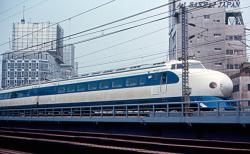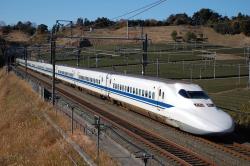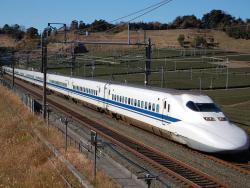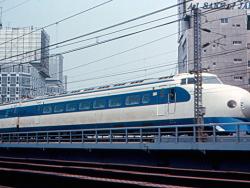In 1964, Shinkansen (which means "new trunk line" and is also known as the bullet train) between Tokyo and Shin-Osaka became the world's first high-speed railway system, running at a maximum business speed of over 200 km/h (130-160 mph).
100-0005

State: Tokyo-to Zip: 100-0005 Country: Japan Website: https://www.asme.org/about-asme/who-we-are/engineering-history/landmarks/211-tokaido-shinkansen Creator: Shima, Hideo

The Tokaido Shinkansen, the world's first inter-city, high-speed railway system, began operations on its route of over 500 kilometers between Tokyo and Osaka more than thirty years ago, in 1964. After its establishment, the Tokaido Shinkansen made a major contribution to Japan's rapid post-war economic growth as the country's principal transportation artery. Today (1997), more than two hundred and eighty Shinkansen trains operate between Tokyo and Osaka each day, with eleven departures an hour at peak times, and a daily ridership of more than 360,000 passengers.
Innovations

The Tokaido Shinkansen, the world's first inter-city, high-speed railway system, began operations on its route of over 500 kilometers between Tokyo and Osaka more than thirty years ago, in 1964. After its establishment, the Tokaido Shinkansen made a major contribution to Japan's rapid post-war…
Read More
In 1964, Shinkansen (which means "new trunk line" and is also known as the bullet train) between Tokyo and Shin-Osaka became the world's first high-speed railway system, running at a maximum business speed of over 200 km/h (130-160 mph).
The nose profile, starting with the original…


